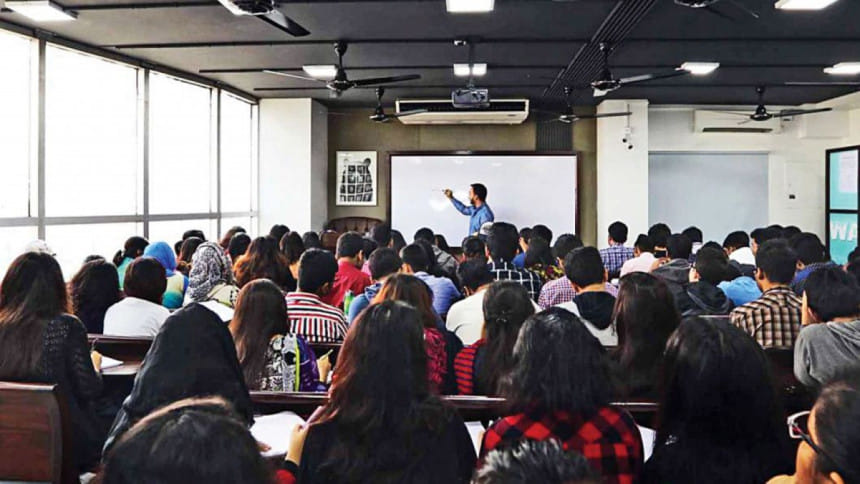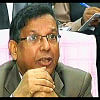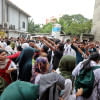'Now the teachers adore me'

"Do you know what my little bird told me after coming home from school? She said, 'Ammu, get me into coaching. If you don't, the miss won't be nice to me.' Then, after seven days of enroling her in the coaching centre, she said, 'Now the teachers adore me'."
Umme Tamima Akhter, the mother of a Milestone School and College student who tragically died in last month's plane crash on the school premises, is seen saying this in a video that has been circulating on social media.
Speaking at a human chain near the school in Uttara's Diabari on August 12, she said her daughter, Mariam Umme Afia, had been waiting for her coaching classes to begin in the very building where the fighter jet crashed. Accusing the school authorities, she asked, "Why did they say there was no coaching? Coaching is a major part of the school."
Her words conveyed more than grief; they laid bare a disturbing truth about our education system, exposing a vicious culture that has eroded the very essence of learning.
Coaching classes run by schoolteachers themselves are not new in Bangladesh. It's a parallel system where students, especially at secondary and higher secondary levels, are taught in groups, either in classrooms or in nearby coaching centres, before or after school hours, by the very same teachers who teach them at school. However, the dependence on coaching centres has reached alarming levels over the past few decades.
Today, it is hard to find a school—government or private, reputed or average, in Dhaka or other major cities in Bangladesh—where this practice isn't rampant. And now, what started as supplementary support has morphed into a shadow economy of education, one that thrives on fear, coercion, and inequality. It serves as an additional financial burden for many guardians across the country.
In many cases, parents feel compelled to send their children to coaching classes and spend hefty fees, not merely due to a lack of quality education at school, but also out of fear. They allege that many teachers intentionally hold back in class, creating conditions where students who skip coaching inevitably fall behind. Some worry their children will be penalised with lower marks or subjected to subtle forms of harassment. Then there is another group of parents, caught in the rat race, who sign up their children for coaching classes without hesitation, hoping that their children will secure top results. In doing so, they help feed the very machine that is hollowing out our education system.
Teachers, however, have some points to share. They say there are significant structural challenges, arguing that the syllabuses of some higher and higher secondary classes are so extensive that completing them within regular school hours is nearly impossible. They often cannot finish a chapter if they address every student's queries in crowded classrooms. In this circumstance, the extra classes and coaching sessions become helpful for the students. A segment of teachers has been demanding that coaching centres be officially recognised as "shadow education."
Yet, despite these arguments, concerns over the exploitative nature of coaching, particularly when run by the very teachers responsible for school learning, prompted the authorities to act. On June 20, 2012, the education ministry of the now-deposed Awami League government introduced a policy to curb the "coaching business" by preventing teachers from tutoring students from their own institutions.
The rules, drafted after a High Court order, allowed a teacher, with permission from the head of the institution, to tutor up to 10 students from other schools. They could also conduct remedial classes for weaker students, but only at the request of parents, and those sessions had to be arranged by the school administration. The policy spelt out implementation steps, set subject-wise monthly remuneration, and even included penalties such as cancellation of the monthly pay order (MPO) for violators.
In February 2019, the High Court upheld the policy, noting that the coaching system had harmful effects on the minds of both students and parents. But in reality, the rules are hardly executed. The policy was not followed anywhere in Dhaka or beyond, while the education ministry and its Directorate of Secondary and Higher Education remained largely silent. Officials routinely cited a shortage of manpower for taking any action, given the sheer number of educational institutions across the country, in contrast to the size of their workforce.
And so, coaching centres continue to reign supreme. In a country where qualified teachers are scarce, the salaries of educators remain dismally low, textbooks change frequently, and the entire system revolves around high-stakes exams, attempting to curb the coaching menace through fragmented policies and guidelines is a futile endeavour. This is a deep-rooted, decades-old crisis that demands more than cosmetic fixes. It calls for a comprehensive overhaul of the education system, from fair and transparent teacher recruitment with improved remuneration to reducing exam pressure and making classroom learning genuinely engaging. Only by addressing these structural flaws can we break the cycle. In an age of artificial intelligence, where knowledge and skills evolve rapidly, we simply cannot afford to let our children's futures be held hostage by an outdated and exploitative system.
Wasim Bin Habib is planning editor at The Daily Star.
Views expressed in this article are the author's own.
Follow The Daily Star Opinion on Facebook for the latest opinions, commentaries and analyses by experts and professionals. To contribute your article or letter to The Daily Star Opinion, see our guidelines for submission.

 For all latest news, follow The Daily Star's Google News channel.
For all latest news, follow The Daily Star's Google News channel. 










Comments